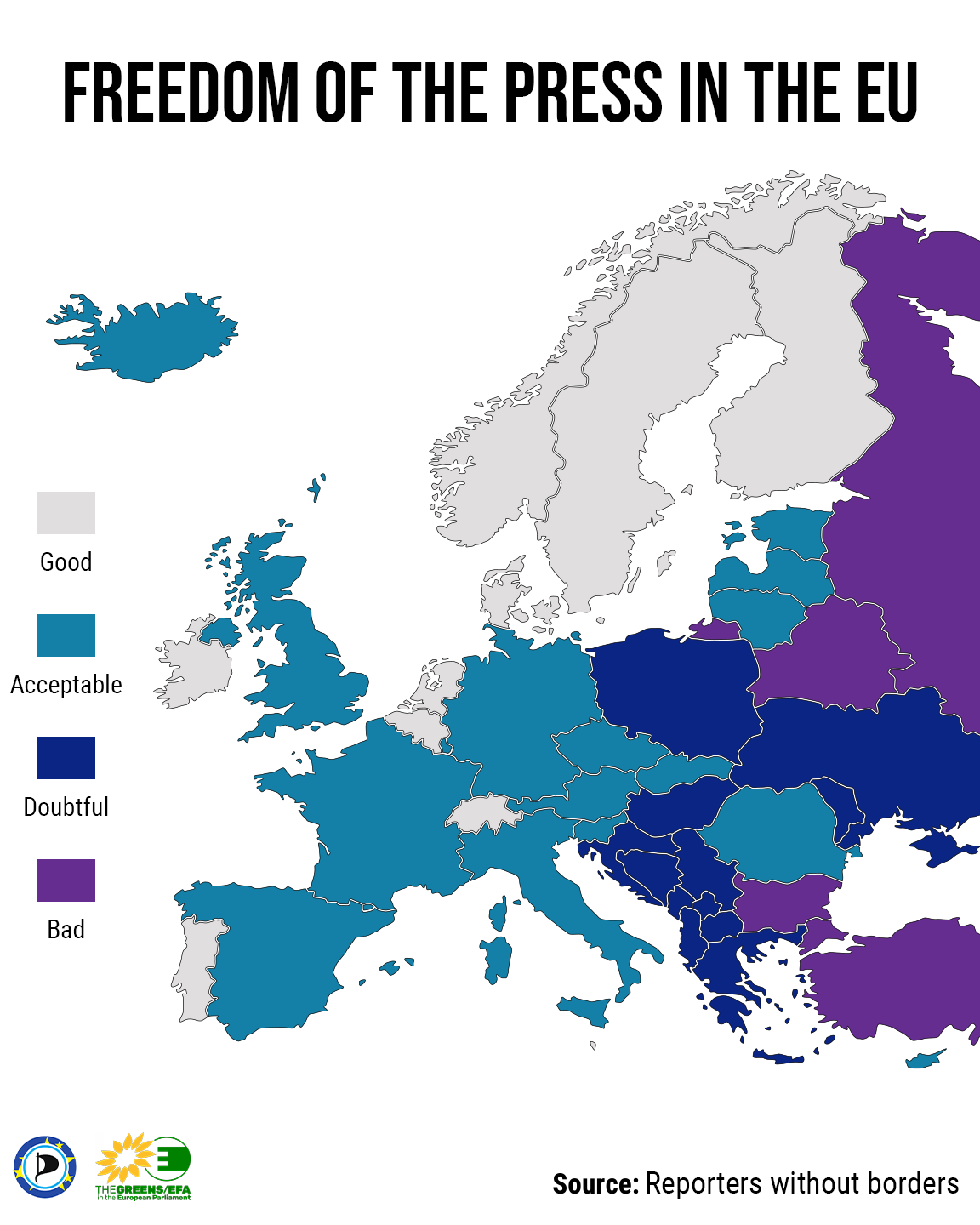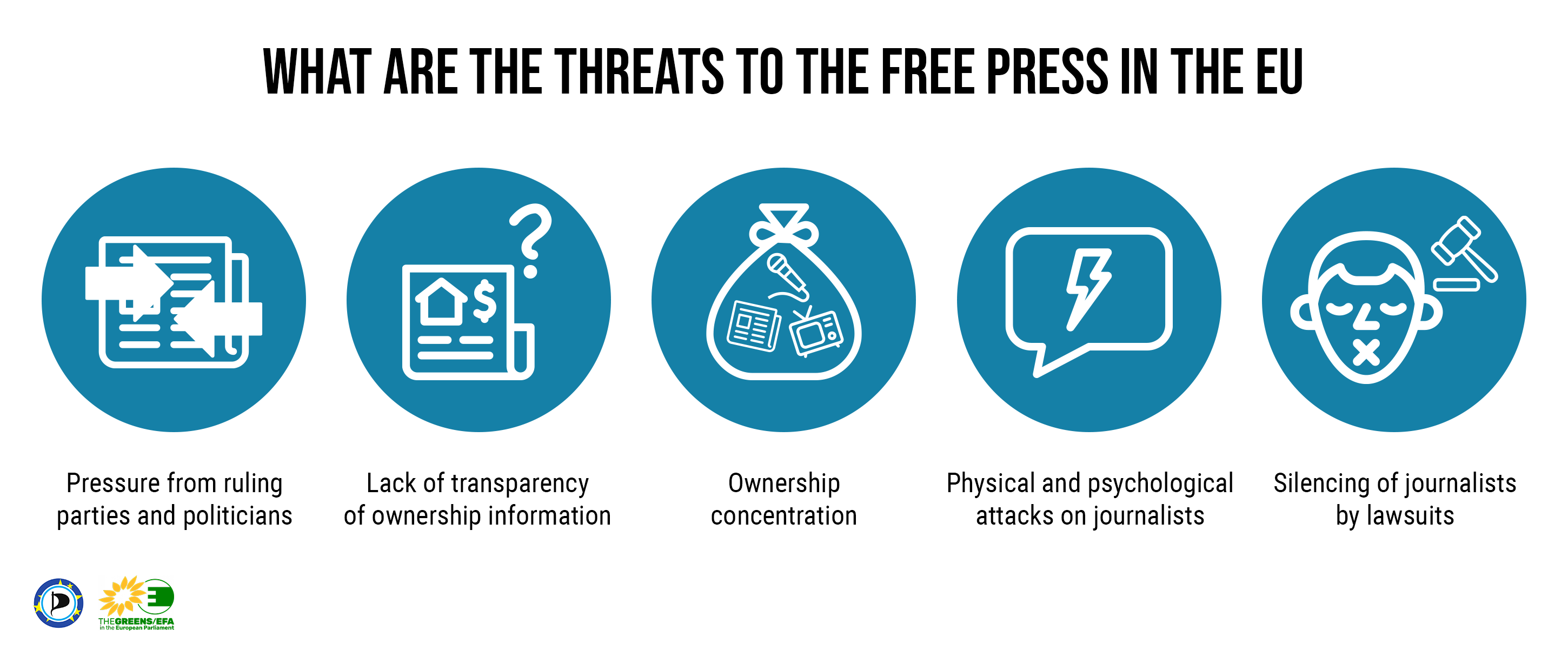Freedom of the press and journalists is one of the principal safeguards of democracy and the rule of law around the world. However, according to a report by the European Commission, some European countries are actively trying to silence their journalists.
Free press is a safeguard of a democratic society. That is why the European Union considers it to be one of its fundamental priorities. Nevertheless, the European Commission’s latest annual report on the rule of law shows that the freedom of the press is not a given everywhere. Some Member States actively try to influence and censor the media, while others attack independent publishers and individual journalists.
Freedom of the press in the EU is on the decline
According to the State of the Rule of Law report, the European Union is experiencing multiple crises regarding press freedom. Transparent and publicly accessible information on media ownership is still not available in some countries. Thus, it is not directly traceable who owns news outlets and what influence they have over the news itself. The report mentions, for example, the Czech Republic, where although there is a law on disclosure of owners, companies are not required to disclose their entire ownership network.
There are also cases where governments and political parties try to interfere in the functioning of the media or put pressure on them, as we can see in Slovenia, Poland and Hungary, for instance. In Hungary, for example, a few years ago, Viktor Orbán merged all the media, not already owned by Fidesz-linked businessmen into a single media union only allowed to produce ‘neutral’ content. In the Czech Republic, the struggle for power over the Czech Television Council, which the government is trying to influence through the appointment of controversial new councillors such as Hana Lipovská and Luboš Xaver Veselý, still continues.
Furthermore, a growing number of politicians are gradually buying up publishing houses and media outlets in order to gain media space, which logically puts them in a conflict of interest. A good example of this is Andrej Babiš, who famously bought the Mafra publishing house when he entered politics, and in the following years expanded his empire to such an extent that he now owns around one third of the media in the Czech Republic, including Mladá fronta Dnes, Lidové noviny, portals such as iDNES.cz, the Impuls and Rock zone radios, Óčko television and many others. As a former finance minister and current prime minister, Andrej Babiš ‘resolved’ his massive conflict of interest with a primitive trick, when he invested his assets in a trust fund. But according to a report by the European Federation of Journalists, this does not solve the problem at hand, as Babiš still has influence over these media outlets.
The coronavirus pandemic too has played a surprisingly large role in press freedom in Europe. With the onset of the pandemic, a number of smaller publishers began to experience financial problems, and publishing houses found themselves on the verge of bankruptcy. Although about half of the Member States helped smaller publishing houses with special grants and funds, publishers in other countries were not so lucky. As a result, publishing houses have had to close down, leaving large areas in some states without local news coverage. In Romania, the pandemic has been used as an excuse to delay or refuse to provide information to journalists, and in Hungary, journalists have been denied access to information through a series of emergency measures.

Viktor Orbán is afraid of the truth
Let’s stay in Hungary for a moment. The state of the rule of law and freedom of the press in Hungary after the accession of Viktor Orbán is declining at a tremendous rate and is more reminiscent of countries such as Rwanda, the United Arab Emirates or Kazakhstan. This is no coincidence at all. Unfortunately, these countries, alongside Azerbaijan or Morocco, share one common factor with Hungary – they spy on their journalists and opposition with the highly sophisticated PEGASUS programme, originally developed in Israel to monitor dangerous terrorist organisations.
The programme can monitor absolutely everything on its victims’ devices, from all the data on their phones, recording of phone calls and conversations to spontaneous activation of the camera and microphone. Investigative work by 17 renowned international media outlets such as CNN, The New York Times, Reuters and AFP revealed that Hungary has spied on a number of critics of the regime in this way, including members of one of Hungary’s last independent news outlets, Direkt36. Two journalists who have long been doing investigative work on Orbán’s Fidesz party have both had PEGASUS activity confirmed in their phones.
I believe I do not need to explain to anyone that spying on independent journalists and the opposition through military technology is way too far over the line in any democratic society. By these actions, Viktor Orbán has once again demonstrated that he does not care about freedom of speech, but only about the interests of his own party, which enables him to deny even the most basic democratic principles, such as the freedom of the press. So when the whole issue of the surveillance of the opposition came to light, he quickly tried to drown it out by calling a referendum on the openly sexist LGBTIQ law that we wrote about last month.
How to stop journalists? Threats in court and physical attacks
Attacks on journalists are sadly not uncommon in the European Union. Investigative journalists in particular are constantly under an avalanche of threats, smear campaigns, psychological and physical harassment, or even physical assault. This is happening, for example, in Slovenia, where Prime Minister Janez Janša prides himself on slandering ‘troublesome journalists’. There are also cases of willful murder, as in the case of the Maltese journalist Daphne Caruana Galizia – responsibility for whose murder lies even with the Maltese Government. This year alone, two prominent journalists have already been murdered in Greece and the Netherlands while covering corruption.
One of the most popular and widely used tactics to silence journalists across Europe is the so-called ‘SLAPP suits’, or strategic lawsuits targeting journalists to suppress their efforts to inform the public. Powerful and wealthy individuals ‘shower’ journalists with plethora of lawsuits that can drag on for years and cost journalists an enormous amount of money and energy. The goal of these lawsuits is not to win over the journalists in court, but to put the journalists under pressure that makes them refrain from informing the public. It is a highly effective way of silencing journalists, who logically cannot afford protracted litigations.
The use of strategic lawsuits is far from uncommon. For example, the aforementioned Maltese journalist, according to the court, was to face as many as 19 defamation suits. In Croatia, strategic lawsuits have a major impact on media output and on the work of independent journalists. In Poland, since the rise of the conservative PiS party, over 55 legal threats and lawsuits, have been filed against Poland’s second largest newspaper, some directly by members of the ruling party.

Freedom of the press should be a priority in the European Union
Freedom of the press and the protection of journalists should be a common standard in the European Union. In order to preserve it, the European Union should use all possible instruments, such as conditioning of the funding of Member States by a good condition of rule of law. If journalists are constantly threatened with financial or physical liquidation, there is no guarantee of quality and independence in journalism. The European Union should therefore do more also to protect whistleblowers as well as journalists themselves from both physical and legal attacks.


0 comments on “How are European countries trying to silence journalists?”